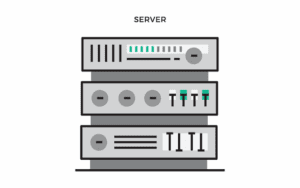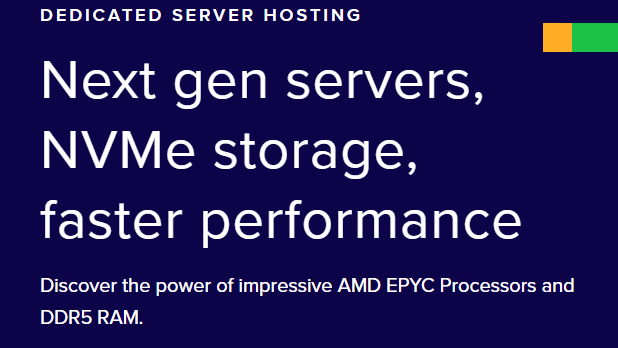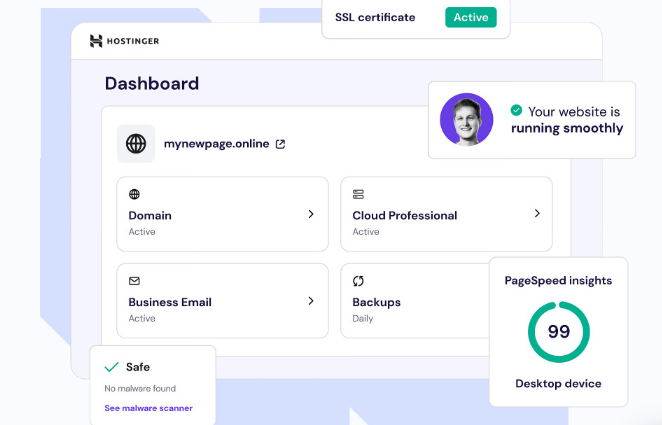A dedicated hosting service is used when a basic (shared) hosting plan is no longer sufficient to meet a website’s storage and traffic needs. In this post, we’ll explain what dedicated hosting is, what to look for before purchasing, who really needs a dedicated server, and whether to choose Windows or Linux servers. But first, without any fluff, we’ll go straight to our ranking of the best dedicated hosting providers—make sure to read until the end, because there’s a lot of useful information. Stay with us!
Ranking of the Best Dedicated Servers
★ Best Value for Money
| Rank | Company | Features | Price | Link |
| 1★ | Servers with 8 CPU cores, 32 GB DDR5 RAM, 1 TB NVMe storage, unlimited traffic, 3 dedicated IPs | $141,19/mo | Get Offer | |
| 2 | Intel Xeon E3-1230 v6 server, 16 GB DDR4 ECC RAM, 2×1 TB SATA with software RAID 1, 4 cores at 3.5GHz, 3.9GHz Turbo Boost | $41,00/mo | Get Offer | |
| A good alternative in terms of Quality vs. Price | ||||
| 3 | Servers with 4 CPU cores, 6GB of RAM, 250GB of NVMe storage, dedicated resources, 1 dedicated IP, SSL certificate, and unlimited bandwidth | $7,19/mo + [SPACEPROGRAMMER10 COUPON] | Get Offer | |
What Is Dedicated Hosting?

Have you ever noticed your site crashing, failing to load after a new post, or struggling during traffic spikes? That means your current server can’t handle the load. It’s time to consider a more robust hosting plan.
If your site or application needs a lot of storage or has very high traffic demands, you’ll need an exclusive server—a dedicated server. As the name suggests, a dedicated server is entirely yours, giving you full control over the environment.
Because you’re in full control, managing a dedicated server usually requires more technical knowledge. It might seem intimidating at first, but this control allows for near-limitless configuration and customization. Dedicated servers offer superior security, flexibility, performance, and far more.
What to Consider Before Purchasing
Some companies provide access to a dedicated server with limited resources, sometimes without a control panel or installer. This will depend on the company and also on what the customer wants. However, the best dedicated hosting companies offer the server with an administrative control panel like cPanel, making it easy to manage both hosting and accounts. Additionally, HostGator offers dedicated support with 24/7 exclusive service for customers who purchase one of their dedicated hosting plans.
Therefore, if you make the right choice when selecting your hosting, you won’t have to deal with any “headaches” after acquiring a dedicated server.
So always check—since it’s a costly service—the tools it provides, the quality of its support, and the features of the plan.
Who Needs a Dedicated Server?
A dedicated server is recommended only for websites, blogs, online stores, and systems that have high traffic and a large need for data storage. Additionally, a dedicated server can be used by companies to create an internal network to run their applications and securely and privately provide access to their data.
Linux vs. Windows: Which Dedicated Server to Choose?
One of the common questions people have when looking to purchase a good hosting plan is which type of server to choose: Windows or Linux. In most companies that provide web hosting services, the plans that offer servers with the Linux operating system are cheaper than those that offer servers with Windows. This happens because Linux is an open-source operating system, meaning it’s free, while Windows is paid. As a result, hosting companies usually pass this cost on to consumers, making plans with Windows OS more expensive.
So the question is: do I really need to invest more and get a Windows server? It depends, but the good news is that in 90% of the cases, no — you don’t need to invest in a Windows hosting plan.
To make this clearer, practically every web application — or at least the majority — is developed using a programming language. Some of the most common include Ajax, C, C++, Java, JavaScript, and Python. Certain systems built with languages like ASP Classic, ASP.NET, Microsoft Access, C#, Microsoft Exchange, and SharePoint do not run on Linux but do run on Windows. However, PHP — the language used to build nearly 75% of all websites on the internet — performs better in a Linux environment than on Windows. Languages like Ajax, C, C++, Java, JavaScript, and Python work well on both operating systems.
Some of the most widely used software for building websites, blogs, online stores, and even more complex systems — such as WordPress and Magento — were developed in PHP. So, if your website is built with WordPress, for example, it’s actually better to choose a Linux server plan.
Best Dedicated Hosting Providers
See below in detail the 3 best companies that offer dedicated hosting services and compare their prices:
1. Bluehost

Bluehost is a top global hosting brand and an official WordPress partner. Ideal for both beginners and growing projects, it offers high-performance dedicated servers with SSD storage, unlimited traffic, a dedicated IP, free SSL, cPanel, 99.9% uptime, advanced DDoS protection, free migration, continuous monitoring, and 24/7 support. Expect speed, security, and premium support.
2. IONOS

IONOS is an established U.S.-based provider offering high-performance dedicated servers in the U.S. market. They provide SSD NVMe storage, unlimited bandwidth, DDoS protection, root access, and automatic backups. Choose between Linux or Windows OS, and enjoy an intuitive control panel plus round-the-clock support in English and Spanish. Their offerings combine reliability with competitive pricing.
3. Hostinger

Hostinger doesn’t currently offer a dedicated server plan, but their Cloud Hosting plans offer similar features with flexibility. Think of it as a near-dedicated environment ideal for projects needing to scale. You pay based on usage, and benefits include dedicated resources, backup automation, and caching—all under one affordable cloud plan.
Are There Alternatives?
Conclusion
This was our post about dedicated hosting servers. We discussed what they are, their advantages and disadvantages, and what to look for when choosing a dedicated server. We also mentioned a good alternative for websites with high traffic that don’t yet require a dedicated hosting plan. We hope this has been helpful—if you have any questions, feel free to leave a comment below. See you next time!
[Updated on 01/14/2026]
0 Comments